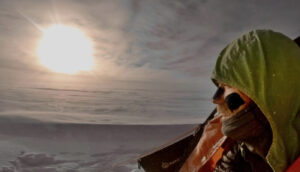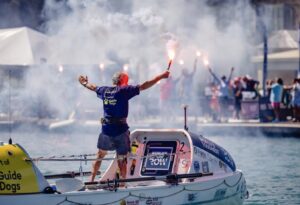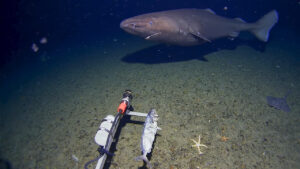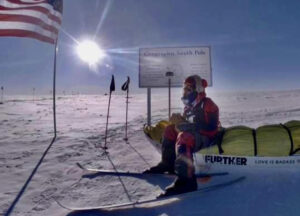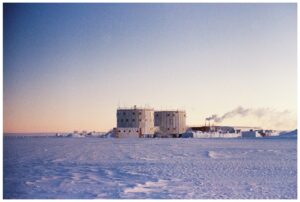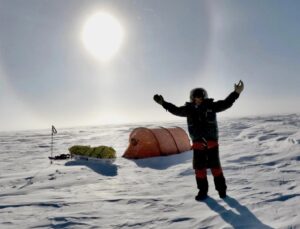Fiann Paul is no stranger to ocean rowing. The 41-year-old is the first and the only person to achieve the Ocean Explorers Grand Slam — crossing all five oceans under human power.
Most recently, in 2019, he led the first expedition to row completely across the Drake Passage between South America and Antarctica. Now with his team of Dr. Mike Matson (U.S.), Jamie Douglas Hamilton (UK), Lisa Farthofer (Austria), Stefan Ivanov (Bulgaria), and Brian Krauskopf (U.S.), he is heading back to Antarctica.

The crew. Photo: Fiann Paul archives
On January 12, they will begin rowing 1,500km across the Southern Ocean and the Scotia Sea, retracing the voyage of Ernest Shackleton and his crew in 1915. All 28 of Shackleton’s men survived, in what has been called the greatest small-boat voyage of all time. Paul and his crew will start at the tip of the Antarctic Peninsula, row past Elephant Island (the starting point of the Shackleton route), and end in South Georgia.
If Fiann and his party are successful, Fiann says that they will be the first to row the Scotia Sea, the first to row from the Antarctic continent, and the first to row the Southern Ocean from south to north. They have dubbed their journey the Shackleton Mission.

The group will row from the tip of the Antarctic Peninsula, past Elephant Island, to South Georgia. Image: Fiann Paul
Fiann Paul spoke to ExplorersWeb about his upcoming, and final, expedition.
This interview has been edited for brevity and clarity
Why the Shackleton route?
Shackleton has become increasingly popular in recent years. Why have you decided to retrace his most famous route? Have you always been interested in him?
Choosing this route has nothing to do with Shackleton becoming more popular. Originally, the expedition was supposed to coincide with the anniversary of his death, but the pandemic meant that wasn’t possible. I knew when I was previously rowing the Drake Passage that I wanted to retrace this route but I needed time to put it together. This voyage is actually the masterpiece of James Worsley and Harry McNish. Shackleton was the coordinator of the whole project but he did not captain this leg of the expedition.
Our row will also be about 110km longer than the Shackleton route. We wanted to start from mainland Antarctica to give us another world first. From here, we will row past the starting place of the Shackleton route — Elephant Island.
The unsung Harry McNish
You are hoping to get the Polar Medal posthumously awarded to Harry McNish of the Shackleton expedition. Why do you feel so strongly about this?
I was thinking about the story one night by the fire and thought this was the theme I would like to build an expedition around. It’s a beautiful way to participate in the history of Shackleton and hopefully rewrite a small section of that history.
It is a historic wrong. He was one of the most competent members of the expedition but he was overlooked because he questioned Shackleton’s expertise. I also resonate with his character: In many of his journals, he complained about the manners and vocabulary of the other crew members. I am an artist and an athlete, so artists tend to see me as this macho control freak who is really regimented. But other athletes see me as a bit of a spiritual hippy. I am actually a bit of both, so I resonate with McNish, who didn’t feel completely comfortable in these environments.

Photo: Fiann Paul archives
You and Jamie are the only crew members who have rowed in polar conditions previously. How have you and your team prepared?
Only 25 people have rowed polar oceans before, and 16 of those were with me, so it would be incredibly difficult to find people with that experience. All the team members have rowed oceans before, other than one who is a sailor — but she rowed competitively.
Training regime
No one had to start training to get ready for this. Everyone involved is always training for something. The biggest difference between ocean rowing and a lot of other sports is that it requires power, endurance, mental strength, and technique. The only way you can train for it is by ocean rowing. There is no other way to pick up the necessary skills.
I do also have very clear fitness thresholds and expectations from my team members, which is not very common. Most ocean rowers don’t pay attention to it, but the athletic aspect is very important. Everyone must be able to hold a split of 2:00 for 15km, at a rate of 18 strokes per minute and a drag factor of 200 on the rowing machine, with their heart rate below 165.
A few months ago, you were still looking for your last crew member. Are you concerned about the limited time you’ve had together?
Sometimes you don’t have a choice, the situation is not always perfect. The last team member changed around three months ago. I started working on this project three years ago, and COVID has seriously challenged it. Only my first mate, the first person to join the expedition, Mike, has not changed. Everybody else has, and that’s just life. Someone was getting divorced, someone else had financial problems. These are things you can’t plan for.
Our geographical locations make it impossible to train as a team, but I am not worried. I am very goal-oriented, and I know I have a team that can be successful. We have weekly video calls, I rowed the Drake Passage with Jamie and have now known Mike for three years. I feel like I know them all well.
Dangers and difficulties
What do you think are the most challenging elements of the row, for the crew and for you personally?
If we end up among pack ice in a high swell, that will be a very scary scenario. That’s the biggest danger. Another real worry is transporting the boat. It is a niche market, and there are no official services. It is people doing you favors most of the time. I constantly have to waive responsibility and agree that the boat could be damaged in transport.
For me personally, there are two big challenges. The first was putting the expedition together. Most people don’t have a clue how much work something like this takes and how many issues there are.
Ocean rowing is not the same as other expeditions. I know mountaineers might not like to hear this, but getting to the start of a mountaineering expedition is simple by comparison. And the fact this starts in Antarctica makes it even harder.
Because of the Antarctic Treaty, we need a supervising vessel. That really ramps up expedition costs. We are paying a significant amount for something that doesn’t even have much to do with rowing.
My second, very personal challenge is that this will officially be my last expedition. After this, I am retiring. I feel very sentimental about it.

Photo: Fiann Paul archives
Capsizing is not a death sentence
This will be your fourth polar row, and second in the Antarctic. What have you learned on previous rows that you will take into this?
One of the biggest lessons was how crucial safety suits and training are. People need to know that capsizing is not this nightmare situation where you’re going to die. It is scary in polar conditions but it is just one of those things that can happen. The suit and capsize training make everyone feel better. It provides confidence and a better mindset.
I have also learned a lot about selecting teams and what I am looking for. I have realized that perfect team members do not exist. Something like this requires so many attributes that only a few people exist who have them all.
Now, I approach most people individually. They need time, courage, physical fitness, experience, the funds to participate and to be happy with me as captain. Some captains are excellent seafarers, but terrible at expedition management and organization. So that has been a big learning curve over the years.
Why did you decide to do this with a six-person crew and not as a soloist or a pair?
The main reason is financing. I try to design expeditions so that I don’t lose or gain any money. A lot of expeditions get poor results because they’ve chosen people with money rather than skill. I would rather have a successful outcome and then recoup the money through public speaking.
Biggest cost: the (required) supervising vessel
Here, I needed a bigger crew because of the timing. A soloist would need to charter the supervising vessel for longer, which costs more. On warmer oceans, I have gone for even larger crews because I am trying to break speed records.
Apart from finances, I like to lead teams. I like the psychology of it, the dynamics of a team, and how different personalities and behavior types work together. It’s fascinating.

Photo: Fiann Paul archives
How does polar rowing compare to rowing in warmer oceans?
Everyone thinks the main difference is the temperature. It’s actually the humidity and the lack of consistent rowing conditions. The humidity really drains you psychologically. The average summer polar conditions are 2˚C and 100% humidity. That means everything is wet and nothing ever dries. Going into your sleeping bag is like crawling into a bucket of water. Visually, you are surrounded by grey. You don’t see much sun. It can be very difficult to cope with.
In warmer oceans, the winds tend to push you toward your destination. People usually time it so that they use the trade winds. In the Southern Ocean, storms are the only consistent weather system. They move over and around you all the time.
You get head winds, tail winds, side winds, all sorts of winds. That’s when the phrase “human power” takes on a whole new meaning. It is a very different rowing experience, so much more physical. That is why I have such specific rowing requirements. I am not trying to be harsh, but it is not about just being there and surviving. You need people who can contribute enough power to make the boat move. It’s a whole different level of challenge.
Introducing the Scotia Sea
You have said this ‘exceeds the difficulty level of the widely feared Drake Passage’. What makes this route more difficult?
There are two reasons. The first is that only half of the Drake Passage is in the Antarctic convergence. The second is that only 20% of the Drake Passage is on the continental shelf. The Scotia Sea is fully in the Antarctic convergence, which makes it colder and more humid, and 50% of this is on the continental shelf. The waves will be much higher, steeper, and sharper, and that is what sailors fear.
Also, the Drake Passage used to refer to both the Drake Passage and the Scotia Sea. Now they have been separated into distinct areas. The book Endurance [Alfred Lansing’s book about Shackleton’s voyage] says that the Drake Passage is the most dreaded bit of water on our planet. It was actually referring to what we now know as the Scotia Sea.

The Scotia Sea and the Drake Passage. Image: worldatlas.com
How long do you expect this to take?
The supervising vessel is only chartered for 40 days, and that includes getting to and from Antarctica and the safety protocol training. That only leaves us 18 days for rowing, so we have to cover about 90km a day. The slowest I have ever rowed was the Drake Passage, and we rowed approximately that daily distance, so I think it is achievable.

Photo: Fiann Paul archives
Absolute firsts
Why do you think no one has attempted this Shackleton route before?
Not many people row polar oceans. I have pioneered most of the routes. I think it’s because it’s so difficult and not at all inviting. It’s not like warm oceans. You can’t consider it romantic in any sense.
It is one of the treasures of the explorer’s world, and one of the places where you have the most to win. These are real absolute firsts, not a speed record or secondary firsts — the first pair to make a certain crossing, for example. You are still able to do things that no one has done before.
You mentioned earlier that this will be your last expedition. Why have you decided to retire?
When I was starting my career, I felt a strong drive to compensate for something, validate something, and to transform something through achieving these difficult feats. It was a rite of passage for me and it completed me in a very much-needed way. It was a form of self-expression. Now I feel I have expressed myself, and there are virtually no oceans left.
The best moment to change direction and charter a new course is when you are at the peak of your career and you can use the momentum. I feel it is time to shift the emphasis from physical performance to artistic or intellectual creativity. As a Jungian psychoanalyst, I would like to become more active through public speaking. I also want more space in my life for art and photography.
Last hurrah
How do you feel without another expedition after this one to work toward?
Yes, the last few days have been very sentimental. I’ve been thinking about this huge part of my life that has defined me. I have built myself around this, so it’s confusing. I keep asking myself, “Who am I without it? Is the real me the artist or the explorer?”
After all these years, I still am not sure who I am. My explorer’s career has not been that successful commercially, but I have achieved great happiness through it. I have gained a lot professionally, and the expeditions have given me credibility. I think that is one of the reasons I am not as motivated to keep achieving in this field. My success and rewards are starting to come from elsewhere. There are a lot of changes in my life at the moment.

